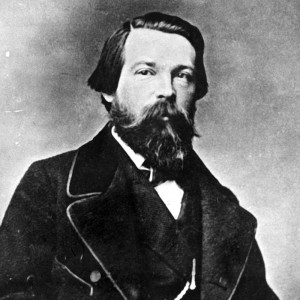Friedrich Engels (28 Nov 1820 – 5 Aug 1895)
BIOGRAPHIES, 28 Nov 2022
The European Graduate School – TRANSCEND Media Service
Friedrich Engels was a German author, political theorist and philosopher, most well known for his monumental work with Karl Marx, The Communist Manifesto and Das Kapital. Friedrich Engels is therefore one of the major contributors to the foundation of modern communism. Among his most noted works are The Condition of the Working Class in England in 1844 (1844), Herr Eugen Duhring’s Revolution in Science (1878), Socialism: Utopian and Scientific (1880), The Origin of the Family, Private Property and the State (1884) as well as another co-written work with Karl Marx entitled The Holy Family (1844).
Like Karl Marx, Engels was highly influenced by Hegel at an early age and felt that, as Tristam Hunt writes, “an idea of modern pantheism [. . .] a merging of divinity with progressing humanity, a happy dialectical synthesis that freed him from the fixed oppositions of the pietist ethos of devout longing and estrangement.” He was a man of varied descriptions, personally he was described as “bighearted” while when encountering political organizations he was known as “ruthless.” Because he helped to finish volumes two and three of Das Kapital after Marx’s death attempting to make parts cohere and make the text able to extend to more fields than mere economics, he is pegged as being the cornerstone of a development of Marxism that led to Soviet Marxists and the institution of dialectical materialism.
 Born in Barmen in 1820, Friedrich Engels’ father was a textile factory owner and partner in a cotton plant in Manchester, England. Engels and his father’s relationship was strained due to his father preference for Engels to work in business. Contrary to his father’s wishes young Engels demonstrated rebellious traits. He dropped out of secondary school and began writing articles under a pseudonym of Friedrich Oswald while placating his father by working in an export firm in Bremen in 1838. He completed a one-year volunteering stint in an artillery regiment honorably (he would continue to be adept at military matters throughout life and friends gave him the nickname “the general”) and while in Berlin he developed a taste for banned authors Ludwig Borne, Karl Gutzkow and Heinrich Heine. As soon as he began to read Hegel, however, he abandoned the thoughts of these authors to embrace a Hegelian dialectic with other young leftists Bruno Bauer and Max Stirner. These “Young Hegelians” felt that to progress all repressive and outmoded ideas must go and their first attack was on the foundations of Christianity which pushed Engels’ agnosticism into militant atheism. He was able to gain access to the circle by his writings as Friedrich Oswald and attended lectures at the university although he had no formal requirements. In 1842 he also met Moses Hess, another important figure promoting Hegel, who told young Engels that the logical conclusion to his dialectic was communism and that in England the conditions with class conflict in regards to advanced industry were becoming more and more apparent. Engels convinced his father to send him to the textile plant in Manchester under the auspices to continue his business training. Engels’ father was pleased that he might be growing out of his radical leanings.
Born in Barmen in 1820, Friedrich Engels’ father was a textile factory owner and partner in a cotton plant in Manchester, England. Engels and his father’s relationship was strained due to his father preference for Engels to work in business. Contrary to his father’s wishes young Engels demonstrated rebellious traits. He dropped out of secondary school and began writing articles under a pseudonym of Friedrich Oswald while placating his father by working in an export firm in Bremen in 1838. He completed a one-year volunteering stint in an artillery regiment honorably (he would continue to be adept at military matters throughout life and friends gave him the nickname “the general”) and while in Berlin he developed a taste for banned authors Ludwig Borne, Karl Gutzkow and Heinrich Heine. As soon as he began to read Hegel, however, he abandoned the thoughts of these authors to embrace a Hegelian dialectic with other young leftists Bruno Bauer and Max Stirner. These “Young Hegelians” felt that to progress all repressive and outmoded ideas must go and their first attack was on the foundations of Christianity which pushed Engels’ agnosticism into militant atheism. He was able to gain access to the circle by his writings as Friedrich Oswald and attended lectures at the university although he had no formal requirements. In 1842 he also met Moses Hess, another important figure promoting Hegel, who told young Engels that the logical conclusion to his dialectic was communism and that in England the conditions with class conflict in regards to advanced industry were becoming more and more apparent. Engels convinced his father to send him to the textile plant in Manchester under the auspices to continue his business training. Engels’ father was pleased that he might be growing out of his radical leanings.
PLEASE CLICK HERE TO READ THE FULL BIOGRAPHY
Tags: Communism, Economics, Frederick Engels, History, Karl Marx, Marxism, Politics, Socialism
This article originally appeared on Transcend Media Service (TMS) on 28 Nov 2022.
Anticopyright: Editorials and articles originated on TMS may be freely reprinted, disseminated, translated and used as background material, provided an acknowledgement and link to the source, TMS: Friedrich Engels (28 Nov 1820 – 5 Aug 1895), is included. Thank you.
If you enjoyed this article, please donate to TMS to join the growing list of TMS Supporters.

This work is licensed under a CC BY-NC 4.0 License.